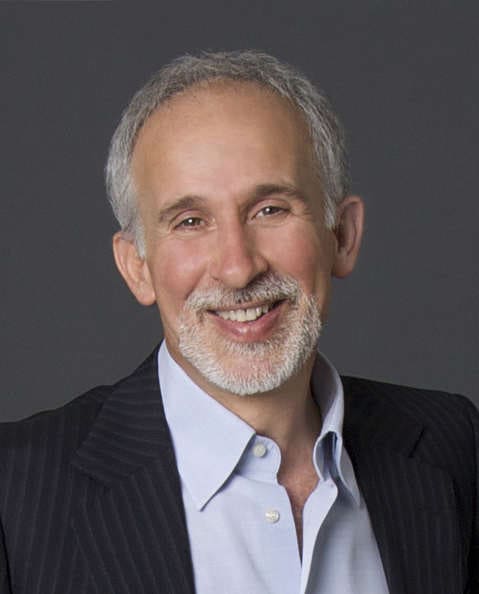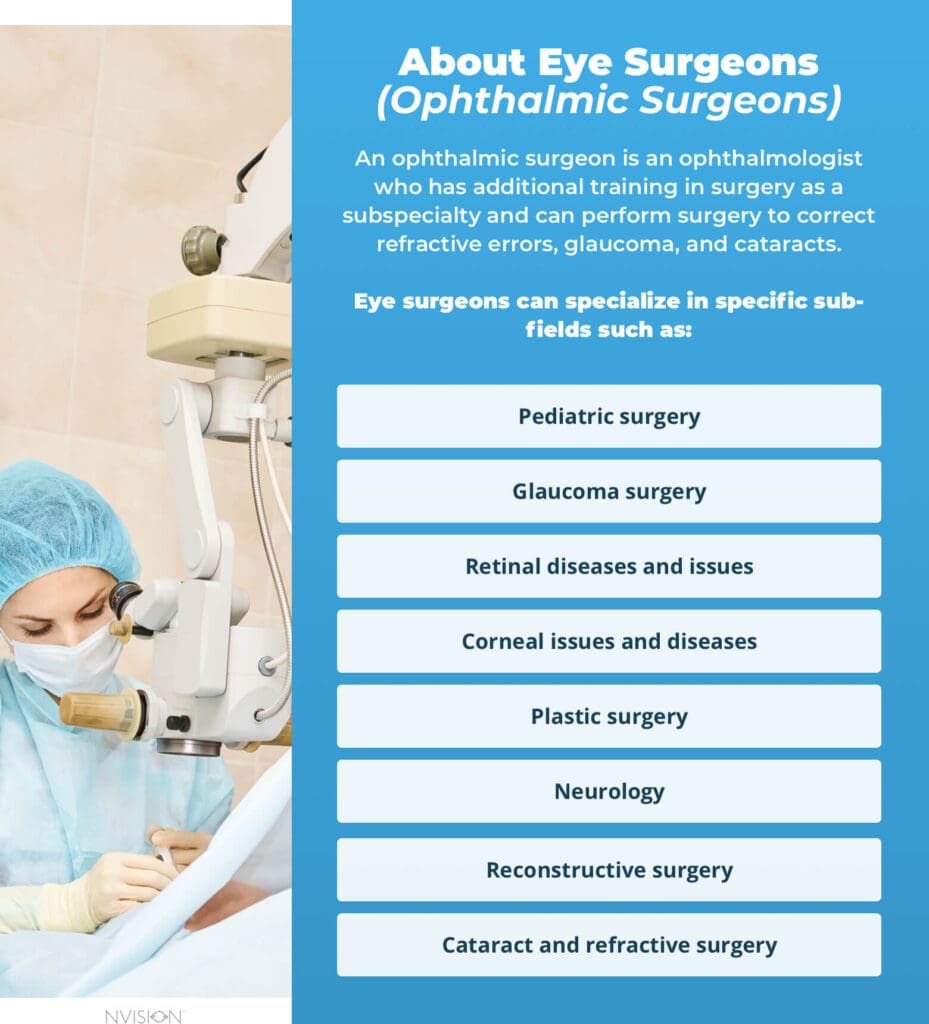
Medically Reviewed by Tom Tooma, M.D., Founder/Medical Director NVISION Surgeon
Ophthalmic Surgeons: What They Do (& Do You Need One?)
Home / Vision Education Center /
Last Updated:

Medically Reviewed by Tom Tooma, M.D., Founder/Medical Director NVISION Surgeon
Ophthalmology is a specialized medical field. It requires 12 to 13 years of training to become certified in both medicine and surgery involving the eyes.
An ophthalmic surgeon has additional training in surgery as a subspecialty. If you need surgery on your eyes, an ophthalmic surgeon can perform it.
Ophthalmic surgeons can perform surgery to correct refractive errors, glaucoma, and cataracts. As medical doctors, they can also diagnose diseases and medical conditions that can impact your eyes. Some surgeons specialize in plastic and reconstructive surgery, but these are generally referred to as oculoplastic surgeons.
Unlike an optometrist, an ophthalmologist is a medical doctor. An ophthalmic surgeon is more specialized than a traditional ophthalmologist.

What Is an Ophthalmic Surgeon?
Ophthalmology is a specialized medical field involving eye surgery. An ophthalmologist has a medical degree. This professional is a medical doctor who also goes through at least four years of post-graduate training, which includes at least three years of training in eye surgery specifically.
An ophthalmic surgeon is even further specialized, undergoing at least another year in a specialty surgical field.
You deserve clear vision. We can help.
With 135+ locations and over 2.5 million procedures performed, our board-certified eye surgeons deliver results you can trust.
Your journey to better vision starts here.
Ophthalmic surgeons can choose to specialize in specific sub-fields, such as:
- Pediatric surgery.
- Glaucoma surgery.
- Retinal diseases and issues.
- Corneal issues and diseases.
- Plastic surgery.
- Neurology.
- Reconstructive surgery.
- Cataract and refractive surgery.
Since an ophthalmic surgeon has undergone supplementary training in a specific surgical field, they can provide a high level of expertise and experience in treating both medical and surgical needs involving your eyes.
What Ophthalmic Surgeons Do

A general ophthalmologist typically provides a mixture of medical and surgical care. They often spend about four days in the office, on average, and one day in the operating room, the American Academy of Ophthalmology (AAO) explains.
As a medical doctor, ophthalmologists often interact with other doctors and treat systemic diseases and conditions that can impact vision and the eyes. Ophthalmic surgeons are even more specialized and highly trained in a particular field.
An ophthalmic surgeon specializes more in surgery than a traditional ophthalmologist. They will likely spend most of their days consulting with patients and performing surgery in the operating room.
Ophthalmic surgeons may also spend time doing scientific and medical research to better understand diseases and conditions within their specialty field that impact the eyes.
While there are various subspecialties, most ophthalmic surgeons focus on addressing cataracts, glaucoma, and other issues related to the retina.
You deserve clear vision. We can help.
With 135+ locations and over 2.5 million procedures performed, our board-certified eye surgeons deliver results you can trust.
Your journey to better vision starts here.
When You Need an Ophthalmic Surgeon
When you need surgery for your eyes, an ophthalmic surgeon can provide the specialized surgery you need. For standard eye exams, treatments, and vision corrections, you generally will not need this high level of specialty.
Ophthalmic surgeons are often more expensive and harder to get into than other eye doctors, and they often require a referral for treatment. You only require the expertise of an ophthalmic surgeon when you have specialized needs. Otherwise, a standard eye doctor can typically help you.
Cataract and glaucoma surgeries are some of the most common surgeries performed by an ophthalmologist. Unless you suffer from an atypical condition or require additional consideration, a general ophthalmologist can usually perform your surgery.
You’ll likely go to an ophthalmic surgeon if you need expertise in a specific field of ophthalmology. Your primary care physician or general eye doctor can help you determine if you need this high level of specialty for your eye and surgical needs.
Types of Eye Doctors Explained

There are several different professionals who are trained to diagnose and treat eye conditions and refractive errors. Their main specialties and differences are explained here:
Optician
These professionals are trained to fit and design prescription eyewear, such as contact lenses and eyeglasses, to correct vision. They use prescriptions written by an optometrist or ophthalmologist. They are not able to test vision, write prescriptions, diagnose issues, or treat eye diseases or conditions on their own.
Often, an optician is the professional you will see after obtaining an eyewear prescription from an eye doctor. They will fit you for your eyeglasses or contacts.
Optometrist
An optometrist is a health care professional that has a doctor of optometry (OD) degree but is not a medical doctor. Optometrists are licensed in the field of optometry. An optometrist can perform eye exams, write prescriptions for prescription contact lenses and eyeglasses, and prescribe medications for many eye conditions.
When you need your eyes checked, require a routine eye exam, or need a prescription to correct a refractive error, an optometrist can help. Often, optometrists and ophthalmologists will work together, potentially even in the same office, to provide a full continuum of care.
Ophthalmologist
These professionals are medical doctors who are licensed to provide both medical and surgical care. They have a high level of training and schooling to provide a wide range of medical and surgical services. As medical doctors, ophthalmologists can diagnose and treat many different types of systemic diseases and conditions that can impact the eyes.
Ophthalmologists can prescribe prescription eyewear and medications as well as perform eye surgeries. When you need surgery on your eyes or require further medical care, an ophthalmologist can provide these services. Ophthalmologists are often also involved in research involving diseases and eye conditions.
Ophthalmic surgeon
Ophthalmic surgery is a subspecialty of ophthalmology. As a result, an ophthalmic surgeon has even more specialized training and schooling in a specific field of surgery. There are several types of subspecialty fields that an ophthalmic surgeon can specialize in, but they usually focus on retinal issues, cataracts, and glaucoma.
Oculoplastic surgeon
These surgeons perform a range of surgeries that focus on the eye socket, tear ducts, eyelids, and face. Plastic, cosmetic, and reconstructive procedures are commonly done by these doctors.
Most people don’t require the services of an ophthalmic surgeon. For general eyecare needs, a standard optometrist is all you need.
When you have further medical or potentially surgical needs, an ophthalmologist is the next step. Oftentimes, your optometrist will refer you to an ophthalmologist if they feel you need this more advanced level of care.
If your needs are even more complex, an ophthalmic surgeon with training in a particular sub-field may be required. Your ophthalmologist may refer you to an ophthalmic surgeon if they feel you need this higher level of specialization.
Talk with your optometrist or primary care doctor about all of your eye issues, including any eye diseases or conditions you have. They can help you determine which type of professional can offer the highest level of care to keep you and your eyes healthy long term.
You deserve clear vision. We can help.
With 135+ locations and over 2.5 million procedures performed, our board-certified eye surgeons deliver results you can trust.
Your journey to better vision starts here.
References
- What Is an Ophthalmologist? (January 2019). American Academy of Ophthalmology (AAO).
- Ophthalmology. (2020). American College of Surgeons.
- What to Expect: The Practice of Ophthalmology. (2020). American Academy of Ophthalmology (AAO).
- Difference Between an Ophthalmologist, Optometrist and Optician. (2018). American Association for Pediatric Ophthalmology and Strabismus (AAPOS).
- Oculoplastic and Reconstructive Surgery. Stanford Health Care.
- Oculoplastic Surgery. (2011). Boston Children’s Hospital.
- Surgeons Speculate About the Future of Ophthalmic Surgery. (August 2017). Ocular Surgery News.
- Ophthalmology. American College of Surgeons.
- Orbital and Ophthalmic Plastic Surgery. UCLA Health.

Dr. Tooma, the founder of NVISION® Eye Centers, has performed well over 130,000 LASIK surgeries, making him the most experienced LASIK surgeon in the Western United States.
This content is for informational purposes only. It may have been reviewed by a licensed physician, but is not intended to serve as a substitute for professional medical advice. Always consult your healthcare provider with any health concerns. For more, read our Privacy Policy and Editorial Policy.
